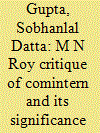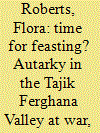| Srl | Item |
| 1 |
ID:
106446


|
|
|
|
|
| Publication |
2011.
|
| Summary/Abstract |
Known by the Russian acronym SADUM, the muftiate responsible for overseeing mosques in the five Soviet Central Asian republics conducted pro-Soviet public diplomacy in the Democratic Republic of Afghanistan after the invasion of December 1979. SADUM's engagement with pro-Soviet ulama in the Democratic Republic of Afghanistan marks a departure from the character of its extensive propaganda and relationship-building activities elsewhere in the Muslim and developing worlds. The Central Asian Islamic scholars staffing SADUM sought to assist the Soviet Party-state in establishing and consolidating a cadre of Afghan ulama who could achieve legitimacy in the eyes of Afghanistan's overwhelmingly Muslim population while maintaining political support for the Communist-oriented People's Democratic Party of Afghanistan.
|
|
|
|
|
|
|
|
|
|
|
|
|
|
|
|
| 2 |
ID:
123405


|
|
|
|
|
| Publication |
2013.
|
| Summary/Abstract |
It is customary to associate M.N. Roy with the Comintern years ( 1920-1928) and highlight his achievements as a leading Comintern functionary primarily in the capacity of a key theoretician of the colonial question. Our attention is thereby generally drawn towards his debate with Lenin in 1920 in the Second Congress and the adoption of his Supplementary Theses on the Colonial Question, apart from his speeches on India and the colonial question in the different Congresses and Plena of the Comintern.
|
|
|
|
|
|
|
|
|
|
|
|
|
|
|
|
| 3 |
ID:
169266


|
|
|
|
|
| Summary/Abstract |
The study focuses on the institution of boarding schools (Russian: internat) in Soviet Tajikistan in the 1950s and 1960s and its role in the education and training of the new national generations of skilled professionals in the fields of industry, science, culture, art and healthcare, which in turn contributed to the development of their country. Along with the de-Stalinization of education and subsequent polytechnization, as well as flexibility in the use of Soviet institutions, the internats were transformed from a purely Soviet project into a more inclusive Soviet-Tajik project at the national level for the training of new young national-Sovietized professionals. These professionals combined the qualities of Sovietized and local (national), with their distinctive norms, traditions and values, into a totally new form. The boarding school system turned into a factory for bringing up national-Sovietized specialists and cadres.
|
|
|
|
|
|
|
|
|
|
|
|
|
|
|
|
| 4 |
ID:
152007


|
|
|
|
|
| Summary/Abstract |
The well-established narrative of the Soviet Union’s victory in the Great Patriotic War emphasizes the enormous sacrifices that it entailed, and the extraordinary sufferings of both the Red Army and the entire civilian population. Throughout the war years, however, reports of lavish feasting and conspicuous consumption taking place on collective farms in northern Tajikistan continued to be submitted to Moscow. The ‘culprits’ were usually local Soviet officials, who appear to have reverted to traditional redistributive practices and modes of patronage. I argue that such acts of ‘anti-Soviet sabotage’ do not necessarily prove that Central Asians understood themselves as colonized subjects making the most of a temporary reprieve from state intrusion. The war in fact casts into sharp relief the extent to which many local officials of the Tajik SSR perceived themselves as loyal Soviet citizens – and as good Muslims, too.
|
|
|
|
|
|
|
|
|
|
|
|
|
|
|
|